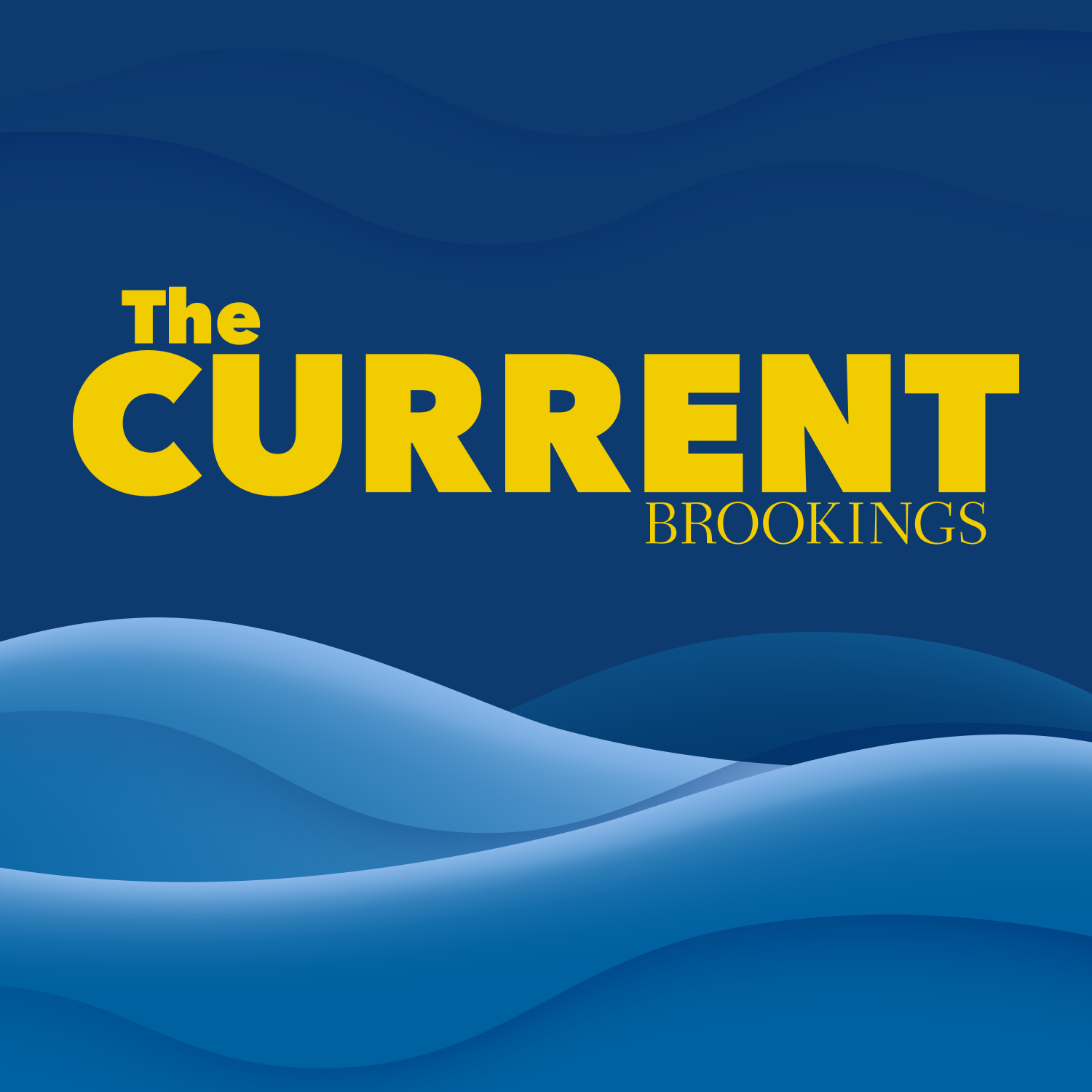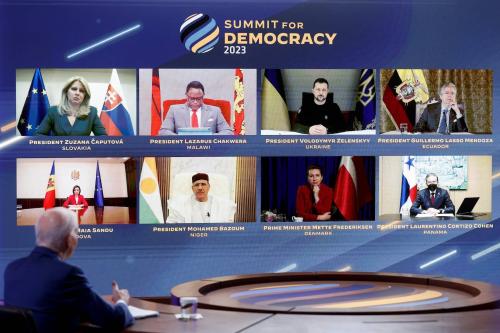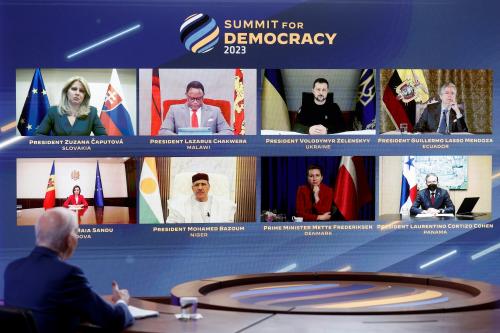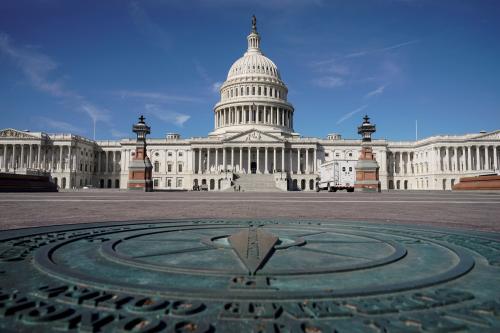The third Summit for Democracy takes place March 18 to 20, in Seoul, South Korea. The theme of the summit is democracy for future generations. To talk about the summit’s critical importance and the role of anti-corruption work in the support of democracy, Ambassador Norm Eisen joins The Current. Eisen is a senior fellow in Governance Studies at Brookings and chair of the Anti-corruption, Democracy, and Security Project.
TRANSCRIPT
[music]
DEWS: You’re listening to The Current, produced by the Brookings Podcast Network. I’m your host, Fred Dews.
The third Summit for Democracy takes place March 18 to 20, in Seoul, South Korea. The theme of the summit is democracy for future generations. To talk about the summit’s critical importance. I’m joined today by Ambassador Norm Eisen, senior fellow in governance studies at Brookings and chair of the Anti-corruption, Democracy, and Security Project at Brookings, ACDS, for short. He also served as President Obama’s special assistant for ethics and government reform.
In December, I interviewed Ambassador Eisen about the work he leads at Brookings to tackle the world’s thorniest anti-corruption problems. So, I encourage you to listen to that episode as well to learn more about this work on anti-corruption ethics and democracy.
Norm, welcome back to The Current.
EISEN: Fred, it’s always great to be with you and our listeners to The Current.
DEWS: Thanks again. So, let’s dive right into it. You and your team are preparing to participate in the third Summit for Democracy next week in Seoul, South Korea. What is the Summit for Democracy?
EISEN: With democracy under threat in the United States and around the world, President Biden initiated an annual gathering of all of the world’s democracies. It’s called the Summit for Democracy. And the first two were hosted by the U.S.
But as a sign that this opportunity for the world’s democracies to talk to each other about the challenges and how to overcome them, but also the opportunities for democracy and how to seize them, South Korea agreed to be the host for this year’s gathering.
So, we’re very proud at Brookings, that we are the civil society co-chairs of an anti-corruption working group. Anti-corruption is one of the three pillars of the Democracy Summit. And as is so often the case, Brookings is right at the center of the domestic and international beating heart of these critical policy questions and how we can do better. And that’s what we’ll be talking about in Seoul, South Korea, at the third Democracy Summit.
DEWS: So, you and your team will be going to Seoul and, what, chairing a panel, participating in conversations?
EISEN: Yes. These, international, gatherings, offer an opportunity, for the world to come together both in person and virtually. We’ll have thousands and thousands of people there. So, myself and my colleagues in the ACDS program here in Brookings Governance Studies—Anti-Corruption, Democracy, and Security—it’s really become one of our signal signature Brookings’s anti-corruption efforts over the years. Very proud to chair it.
We’ll be hosting seminars, meetings, talking to colleagues. I’ll be giving keynote remarks at a panel to talk about how we fight corruption, the progress we’ve made, and how far we have to go to really make sure that our democracies are vital.
Fred, it turns out that fighting corruption and fighting autocracy go hand in hand. One of the first things that illiberals and autocrats and the dictatorial minded do when they get power is steal. They find ways, often legal loopholes, to direct funds into their own pockets and that of their allies for personal gain, but also to fund creeping illiberalism. And so, we have to fight that. And that’s what the ACDS program and the Summit for Democracy is all about. We’re very excited about it.
DEWS: I think it’s worth pointing out, too, that your term “illiberal” is not just the term that you’re using. That’s the term Viktor Orbán himself has used to describe governance in Hungary, for example, illiberal.
EISEN: Hungary is really one of the signature examples of how democracy can, deteriorate. And Viktor Orbán has proudly proclaimed Hungary now and illiberal democracy. He’s done things like take power away from the independent courts, put his own people in charge. Weaken the rules so the courts are not a bulwark of checks and balances. That’s one of the signs of liberal democracy. We believe in checks and balances on government power, whereas Illiberalism believes in a more autocratic, dictatorial form of government.
Orbán has used state power to go after his adversaries. He’s changed the constitution. Another sign of liberalism is restraint in the use of the state to allow dissenting voices to flourish. And constitutionalism—having strong protections, rights for the people. Orbán has weakened the constitution there. He’s used his supermajorities to have a series of policies where he targets migrants, scapegoating of vulnerable populations. That’s another sign of illiberalism.
America, by contrast, the world’s greatest liberal power—not in the sense of partisan liberals, but in the sense of this philosophy of limited government, of protecting the rights, including of minority rights against majority, checks and balances, strong constitution, strong rule of law—all those things Orbán or Erdogan in Turkey, Putin in Russia, Xi verging into outright dictatorship. All of these things are of the signs of illiberalism and autocracy. And now, that’s a threat right here in America.
So, the summit for democracy is a way, irrespective of any partisan politics, people coming from all across the political spectrum, coming together because we believe in democracy.
DEWS: Norm, it’s my understanding that this year alone, 64 countries with about half the world’s population have had or will have elections, including, of course, the United States. You and your team authored a piece that’s on our website—I’ll link to it in the show notes—in which you stated that, quote, “democracy is on the line globally in 2024,” unquote. Why did you write that? What’s at stake this year in these elections?
EISEN: The stars have aligned this year for half of the world’s population to choose whether they’re going to strengthen or weaken their respective democracies. The most fundamental aspect of democracy is that the people choose their leaders, not the other way around. So, elections are the foundation. And when you have sham elections like Putin in Russia—nobody thinks that’s a serious election—that’s a sign that democracy is weakened or is gone. I don’t think, anybody would describe Russia as a democracy.
When you have genuine elections, on the other hand, and you have respect for elections, that is a sign of a thriving democracy. And so, this year, with over 60 countries representing half the world’s population having elections in 2024, including many of the world’s major democracies, above all the United States, democracy truly is on the ballot globally.
And we have seen a phenomenon—I’ve written about it with our colleague Elaine Kamarck—in the United States of attempting to undermine and threaten our elections by making false claims about their validity or articulating bogus legal challenges. So, it’s both false facts and evidence on the one hand about the legitimacy of elections, claims that elections were stolen when no such thing happened. The American election system is vibrant. But we’re expecting to see that.
And on the other hand, false legal attacks on our elections. We are attempting to see that again in the United States and around the world. This phenomenon of election denial is not unique. When Mr. Bolsonaro lost his election in Brazil, he also claimed it was stolen falsely. There was also an attack on their legislature like our January 6th attack on Congress. And like in our country, there are criminal proceedings relating to all of that activity. Investigations and cases going on in Brazil. It’s very important that you have accountability when such conduct transpires.
DEWS: I’d like to go back to this nexus between corruption and democratic erosion. Which one causes the other? Is there corruption and that causes democratic backsliding? Or democratic erosion happens and then that opens up the field for corruption, which then is sort of a feedback cycle that entrenches both?
EISEN: Like all complex social phenomena, it’s the chicken and the egg. If I were forced to trace the antecedents—and I’ve done this for Brookings in a precursor that we held, an annual conference on corruption where we brought together stakeholders from around the world, the World Forum on Governance that Brookings convened for a number of years—these experts agreed that there’s a vicious cycle of corruption and democracy and a corresponding virtuous cycle. It starts in campaigns where corrupt cash flows from interested parties are covertly affecting campaign outcomes. And then, once the candidates who are affected by the campaign corruption get into office, those same candidates pay back in various ways those who provided the illicit benefits. And that can include government contracts and other forms of official action.
And so, you get a vicious cycle, then, you know, this is this is, the allegation against Orbán, Erdogan, Putin, Netanyahu. I’ve been very outspoken in pointing out the corruption allegations against Netanyahu. Hamas also accused of grand corruption, siphoning billions of dollars so they can live in luxury while the people they purport to represent suffer. So, that’s the vicious cycle.
That’s one of the issues in a way that’s at stake in the Alvin Bragg prosecution of former President Trump that will commence shortly in Manhattan. Braggs’ case alleges—former president is innocent until proven guilty—but he alleges that in 2016, a series of corrupt, payments were made to benefit the campaign of Donald Trump in the form of hush money to avoid damaging scandals, and that those payments were covered later covered up while the president was in office through personal and business record falsification. So, it’s kind of a variation on this idea of the vicious cycle. So, that’s the origin of it if you forced me to pick something.
DEWS: I’m going to go back real quick to that article that I referenced that your project wrote for the Brookings website. You paid a lot of attention in that piece to how corruption affects young people and how young people are, quote, “the current and next generation of democracy’s defenders.” And with the Summit for Democracy’s theme being democracy for future generations. Can you speak to that nexus of democracy and youth and corruption a little bit?
EISEN: Well, the young people of our country and the world are the most profoundly affected because when these autocrats and oligarchs and plutocrats raid the coffers of society, they’re stealing the money that should be used to protect the futures of our young people. The money that a Putin siphons off from the system with his oligarchs and cronies could be spent on education, primary, secondary university education for young people. On building economic infrastructure so they have good jobs. On making sure that they have adequate health care when they start their families, prenatal care, for moms and early childhood education for kids. They’re really siphoning off the funds that should be used to guarantee a future for the next generation.
But conversely, young people are also the ones who are the victims of this shocking theft, diversion of resources. But also, I have the energy, the freshness to solve the problem. Because they come to this with the determination of youth to make things better with their own lives at stake. And they’re not co-opted by corrupt systems. So, the hope is that the demand of young people, and in particular young people, coming back to your question about elections, turning out in force. I would like to see an expectation of youngsters that we have 100% turnout, Fred, to protect their futures. And turning out in force this year to vote, to say, hey, we want honest government, and whoever they vote for to analyze the issues and to prioritize anti-corruption.
Whatever your beliefs, nobody can think that this corruption that democracy is struggling with is a good thing. And we’ve seen that right here in the United States, where I often like to say it’s the legalized corruption that’s the real crime, where the special interests—and this is not unique to one party. We’re seeing a very serious, set of allegations against a sitting United States senator, Bob Menendez that he took large sums of money, including to benefit—Fred, he’s being prosecuted for allegedly—again, innocent until proven guilty—allegedly having attempted to benefit foreign countries. How much worse than that can allegations get?
And then on the other side of the aisle, when former President Trump was in office, I wrote a lot at Brookings about his emoluments violations. And these were adjudicated, that the Constitution says you can’t take money from foreign government or indeed from U.S. governments, federal or state, because it distorts your decision-making. And he’s been found to have accepted millions and millions of dollars of that constitutionally prohibited money. So, this is not a problem that is unique, historically speaking, to any one party.
DEWS: I’d like to wrap up Norm on this question of former President Trump and the election. You testified to Congress, the House of Representatives Select Subcommittee on the Weaponization of the Federal Government, in which you said, quote, “the most imminent threat of that weaponization now facing us as a nation [is] Donald Trump’s record of weaponizing the government and his promises to double down should he return to power,” unquote. So, what would a second Trump term mean for U.S. anti-corruption agenda at home and abroad as well? What would it mean for the Summit for Democracy?
EISEN: I think that there can be no more important issue both in the United States and around the world. And, Fred, that’s why Brookings has made the big investment that it has in our Anti-Corruption, Democracy and Security, ACDS, Initiative. We believe that the fight against corruption and the work that we do, meeting our hallmarks of, quality, impact, and above all, independence—it’s not always popular when you talk about corruption and when I testified and laid down the gauntlet, some of those on the dais, some of those members pushed back, and I pushed back on the push back.
And that is the importance of Brookings. It’s why year after year, we are ranked as the number one think tank in the United States and around the world. We’re willing to speak out about these hard truths and to be on the front line.
And if I may end on an optimistic note, and to answer your question in a sense of what it might mean, I would point to our work already over the long tenure of the Brookings Institution, America’s most venerable think tank. We have bent the arc already, and the mere fact that after decades of advocating for the centrality of anti-corruption to democracy, that it is one of the three pillars, the three most important aspects that the Summit for Democracy coming up in Seoul, its third edition—all three of the summits have focused on. That is an incredible breakthrough.
And I think that as we continue to push forward and achieve the dream of a truly inclusive democracy here in the United States and with our partners around the world, in a time of increasing threat to democracy at home and abroad, we need to double down on this. And doing so will mean that democracy continues not just to survive, but to thrive.
So, I think our best days are ahead of us. We’re in challenging times. The indicators show that. All of the metrics of democracy in the U.S. and around the world are showing the stress and some of the slippage. But I have confidence in the people of the United States and around the world. They like their democracies, Fred. And I think they are going to speak up for them.
I’m so grateful for the opportunity to come and speak with you and all the listeners of The Current once more, to talk about the wonderful anti-corruption work we’re doing in Brookings, in our Governance Studies program, in the ACDS—Anti-Corruption, Democracy, and Security program—with my fantastic colleagues who run the day-to-day with me: John Katz and Robin Lewis. And I hope you’ll have me back to talk with the listeners of The Current about the evolution of this critically important issue that we’re so excited to address at the third Summit for Democracy in Seoul.
DEWS: Well, of course, Norm, we will have you back. It’s always a delight to speak with you about this or any topic that there is to speak about. Thank you for your time today. And listeners, you can learn more about the Anti-Corruption, Democracy, and Security Project and its vital work on our website, brookings.edu slash ACDS.
[music]
The Brookings Institution is committed to quality, independence, and impact.
We are supported by a diverse array of funders. In line with our values and policies, each Brookings publication represents the sole views of its author(s).








Commentary
PodcastFighting corruption’s threat to democracy
March 14, 2024
Listen on
The Current Podcast